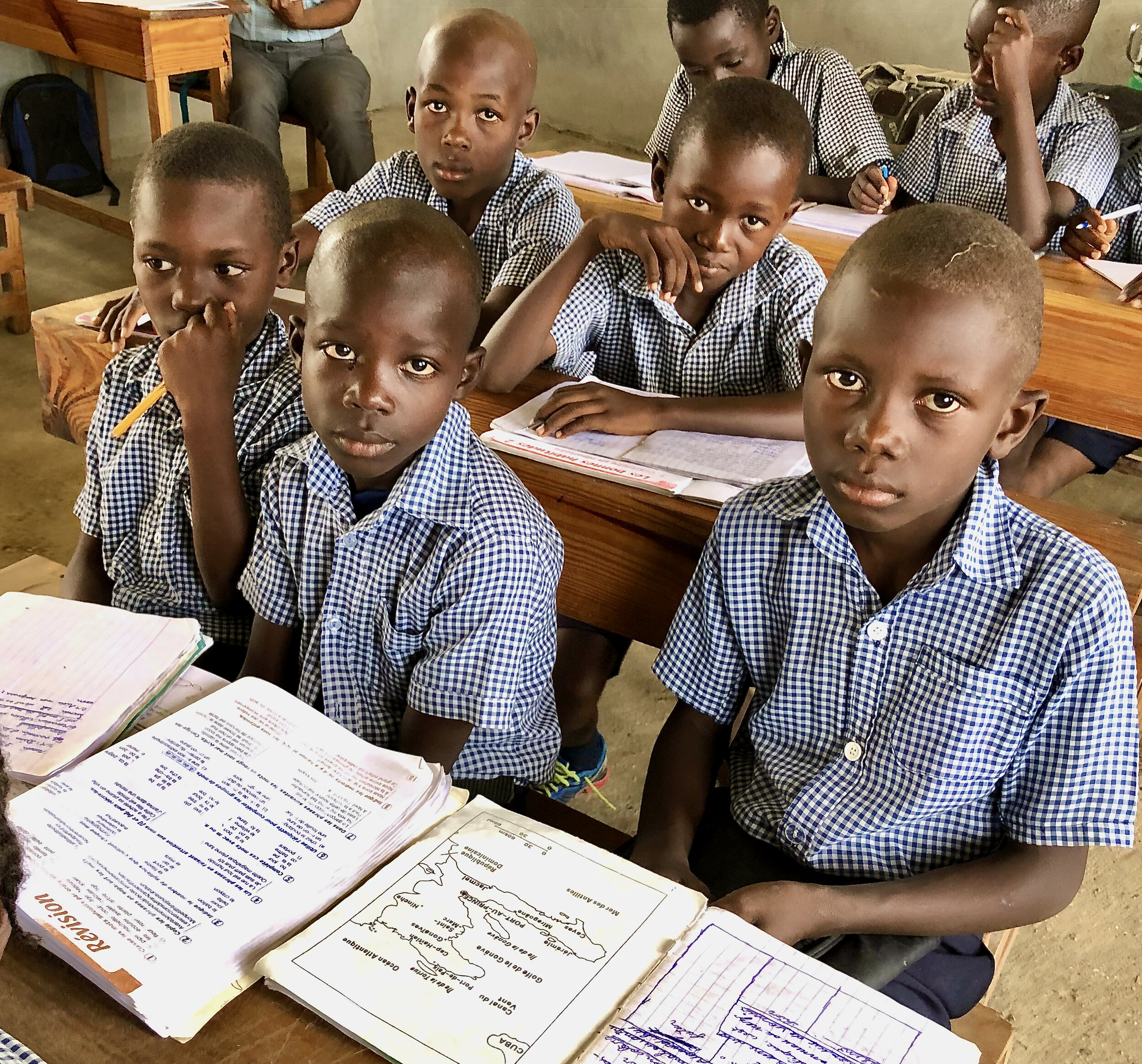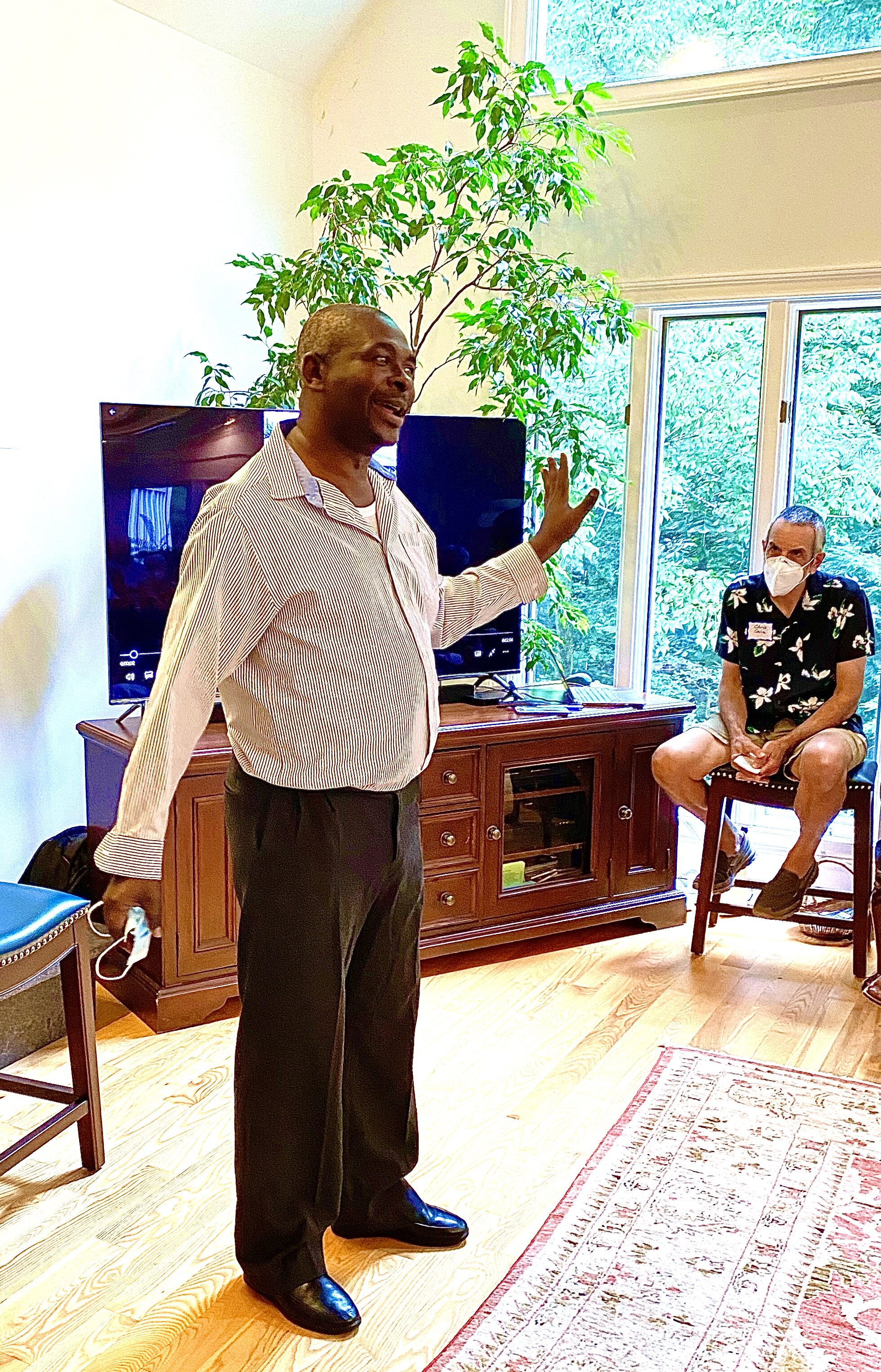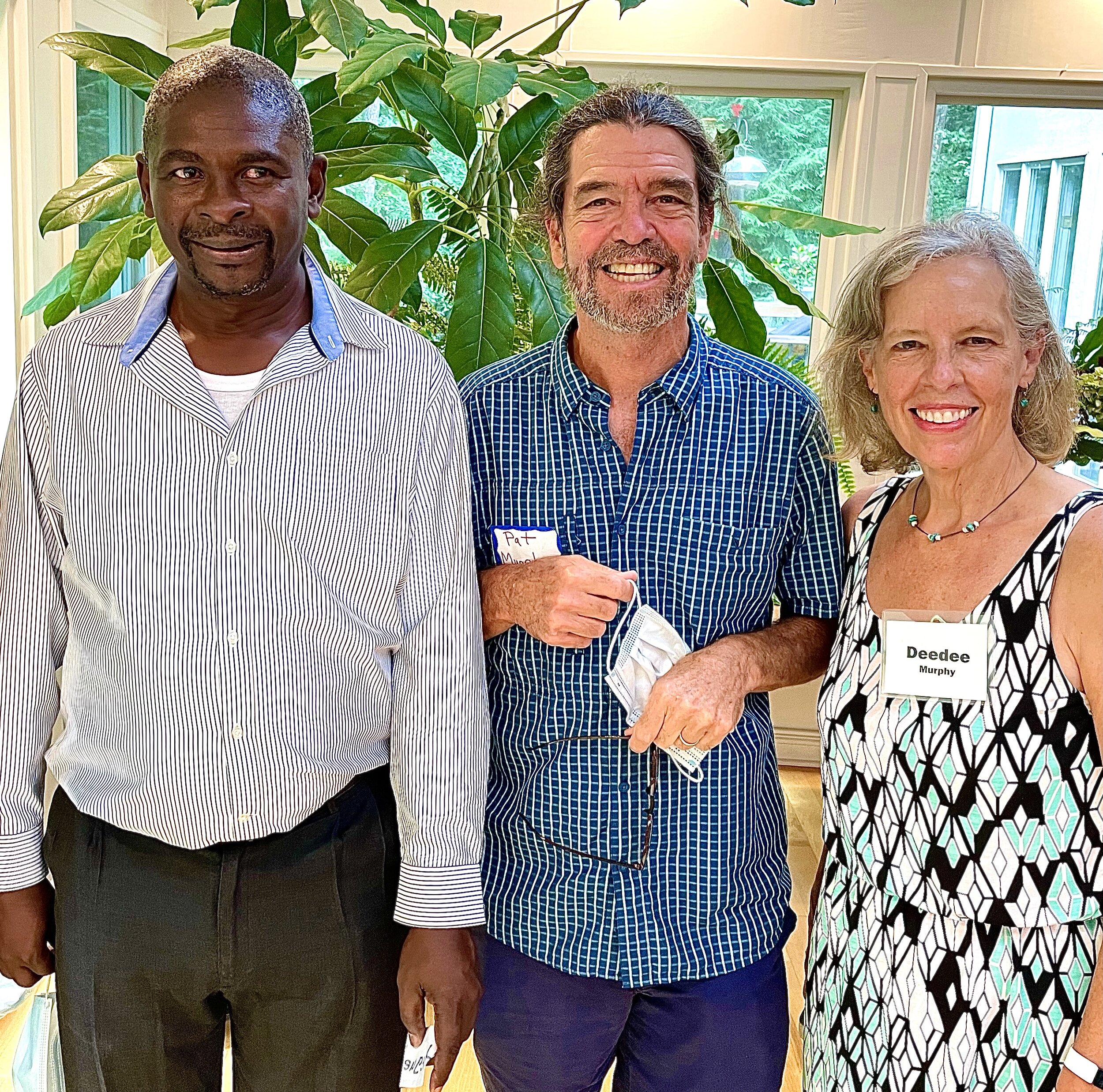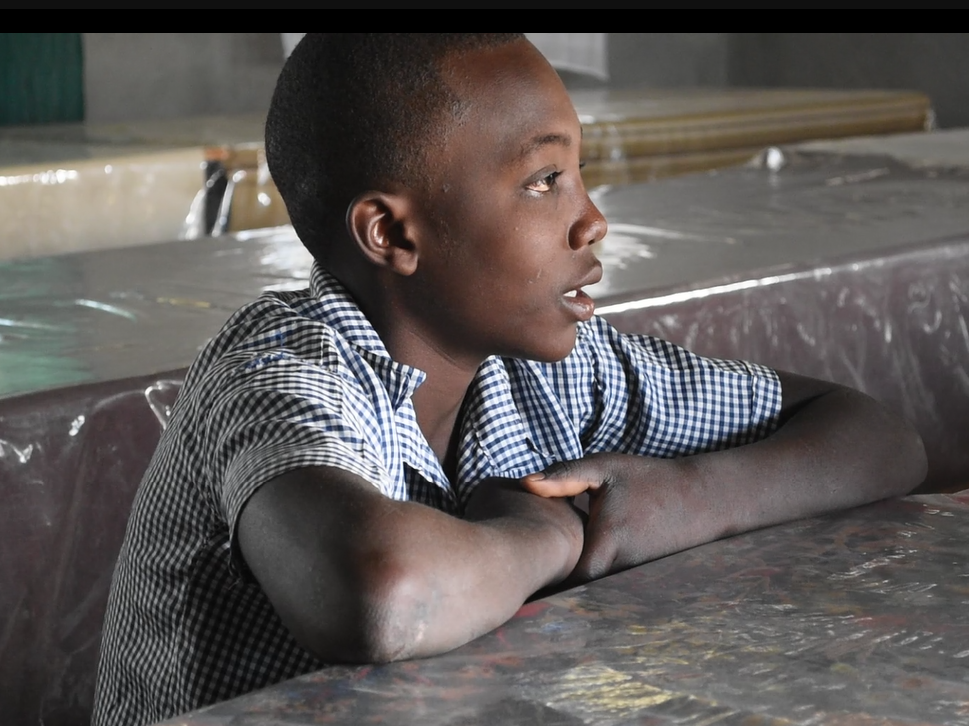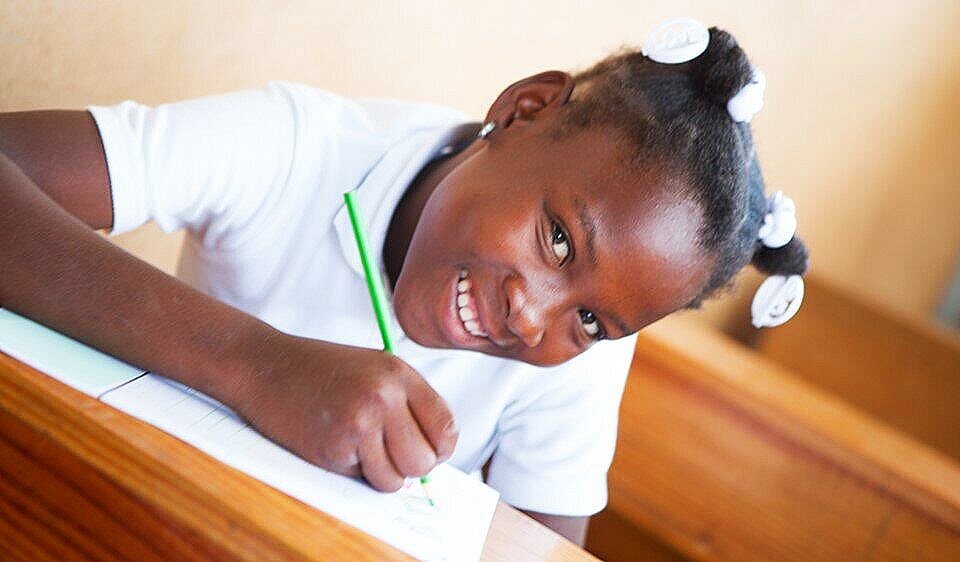Beatrice in 2021
Her name is Béatrice Brunet, she has lived with her Aunt since the death of her mother in the earthquake on January 12, 2010. She lives in village #4 and just completed the 9th grade at the Ecovillage school. She described to us how she worked during the school year to prepare for the state exam: “We started the school year well even though I went a little late due to economic difficulties. My aunt struggles because she already has 3 other children under her responsibilities. We have teachers who come to work regularly every day and we have lessons that end around 2 p.m. Sometimes it is difficult for us because we are often very hungry. There was hardly any food this year but we stayed to take all of our classes. ”
When asked what she is going to do during these Holidays or what she would like to do she replied: “I have no plans for the summer, I do not know what my Aunt will give me as responsibility. But if I had the possibility of going in training camps for young people, I could take advantage to recreate myself and also learn. I would like to learn to sew, learn to use computers ... "
We asked her "If you pass the grade 9 exams, which school would you like to go to continue with your classical studies?" “I don’t know. College tempts me but I certainly won't be able to afford college. I will probably go to high school in Colladere or Hinche.”
When we asked what she would like us to do to improve in school, she replied "I hope we can paint the school, build a computer room like I saw in a school in Hinche."
Thank you very much for your support and your prayers. The school was able to continue all of these programs despite this difficult year. It is because nothing can stop our God! Thank you for continuing to support my country through education.
- article contributed by Carlos Sinfinice (6/27/2021)
Though the mountains may be removed and the hills may be shaken, My loving devotion will not depart from you, and My covenant of peace will not be broken," says the LORD, who has compassion on you. Isaiah 54:10
The Pandora Papers and The EcoVillage School
The future for these children is jeopardized by people who steal from Haiti’s wealth.
A Haitian-Atlantan member of the Atlanta EcoVillage School Partnership steering committee gets upset when we say that Haiti is the poorest country in the Western Hemisphere. He says “We are not the poorest. We have great wealth and natural resources.” How can this be true when all the statistics show that Haiti has the highest percentage of its people who are impoverished, illiterate and hungry? The Pandora Papers show how both these seemingly contradictory realities can be true.
To get the full story we refer you to this front page story in the Miami Herald: “Pandora Papers: A mega wealthy man from the region’s poorest country — and his Miami palace” A caution: it will make you angry or disheartened.
The Bigio’s are one of a handful of families that control Haiti’s business and wealth, traced back to the days when dictators gave them export/import monopolies in exchange for bribes. They extract wealth from Haiti and hide it in shell companies that invest in rich countries. Many rarely step foot in Haiti any more. Nicknamed MREs (Morally Repugnant Elite), they use their wealth to control the government and maintain their monopoly positions. Many Haitians believe that funding for the recent assassination of President Moise by Colombian mercenaries can be traced to his efforts to break up the electricity monopoly. Even though Moise was a beneficiary of the system – he was known as “Banana Man” – his disruptive efforts were viewed by the MREs as a threat to the system from which they have benefited so greatly.
How does all of this relate to us?
When we began the school project, we were asked by several donors why the costs of construction materials, such as concrete and rebar, were so high. The Bigio family controls the importation of those commodities. They took their slice of our contributions when we bought those materials to build the school.
Our original goal was to build a financially self-sufficient school. The path to local funding was to qualify as a national school, which the Haitian Constitution requires the government to fund. In our 5th year the school received certification and all of our teachers are nationally certified as well, which qualifies the school for government support. We achieved our side of the bargain within our 5-year window.
But the government has no funds to pay teacher salaries, which is the way the Haitian system is supposed to support its national schools. Why doesn’t the government have those funds to educate its children? MREs evade taxes with international banking mechanisms that are too sophisticated for the Haitian government to figure out. Half of Haitian kids never learn to read because the money for their schools is stolen by MREs. Morally Repugnant Elite, indeed. Since they are by far the most powerful entity in the country a weak, corrupt and incompetent government is in their interest.
The MREs could do so much for their country. They have the business skills, connections and resources to build up Haiti’s economy, to begin with creating an educated workforce. They could be the vital ingredient for a resurgent nation. They, too, participate in a bigger system in which their wealth is not unusual. Many poor countries around the world suffer similar dysfunctional systems. The Pandora Papers reveal the tip of an international iceberg of which Haiti is simply one of many. Solutions will take international cooperation and generations to fix.
What are we supporters of a small school in rural Haiti to do? We know that we cannot fix Haiti or the international system in which it is trapped. The Atlanta EcoVillage School Partnership grappled with these very issues during a series of meetings this year to chart our future. We midwifed this school. We decided to work to keep it open for the 2021-2022 school year. Because of your support, we were able to fund the first semester which began in September and we will ask you to fund the winter semester, too. Fixing an inequitable international system is beyond our power. Providing opportunity for 280 country children seems to be within our grasp. That is what we will try to do. Thank you for joining us in that effort.
Survivor of 2010 Earthquake Provides Earthquake Relief Aid in 2021
Carlos arrives in earthquake disaster area to begin relief efforts.
A Haitian medical team from Hinche flew to Southern Haiti on August 15th only one day after a devastating 7.2 magnitude earthquake struck centered around Les Cayes. Our friend, Carlos Sinfinice, was a member of this first response team. He is the oldest child of a family that lives in the Ecovillages in the Central Plateau of Haiti and has just graduated from medical school in April, 2021.
The university that sponsored the team was able to send them by air bypassing the gang-controlled area around Port au Prince. On day one, they started treating the injured and providing supplies to those in need. They then made their way to the Saint-Antoine de Jérémie Hospital which is located in an area only slightly impacted by the earthquake. From this functioning facility, they provided adequate care for the people.
Many of the survivors of this year’s earthquake lost all their material possessions and were living in the streets with no food or water. The aid the team offered was very welcomed. On the third day of their relief efforts, the area was struck by a hurricane which only added to the stress of the situation. As the storm cleared, the team continued their work of distributing food kits and providing necessary medical care.
Visit the photo gallery to see the team in action.
In a quieter moment, Carlos pauses to reflect on his many blessings. He writes, “Have you ever asked God why He loves you, why He protects you, why He does all these miracles in your life, when you don't feel different from the others yet you have the impression that He chose you and that you have a great destiny.
This is how I feel. I come from a poor family and here I am a doctor. I was in Port-au-Prince during the earthquake of January 12, 2010. I was there. I almost fell victim. I spent 2 months sleeping in the streets of Port-au-Prince not knowing whether I was going to eat or not. And here it is, I am helping the earthquake victims.
One day when I was in the first year of faculty I missed 3 days of class because my only shoes were torn. And here today. I have about 4 or 5 pairs of shoes, and a car that is on the way.
Why has God given so much. I am nothing but a sinner like the others. But is it true how am I different?”
We are glad to know that Carlos and his friends are back in Hinche now. They are safe and fulfilled knowing that they were able to help some people. But they also know that the hard part is rebuilding the area impacted by the earthquake. This is a long process. Some of the people impacted by this year’s quake had not fully recovered from the impact of Hurricane Matthew in 2016.
This is not the first article we have written about Carlos and likely will not be the last. He is a remarkable young man. He is blessed by God and by our support of his journey.
Our mission isn’t to simply provide emergency relief and help with recovery. We are working to help Haitians build a better tomorrow.
Follow this link to view a gallery of photos Carlos was able to send during their relief efforts.
Team of doctors from Hinche among the first to reach victims of recent earthquake in Southern Haiti.
Good times with great supporters!
The Reception for Heguel was a huge success! Over 45 friends of the School gathered to meet Heguel and to renew friendships. We celebrated, listened, asked, listened more and heard updates from the EcoVillages and the School. (Click here to see more photos.)
The Haiti EcoVillage School Partnership is grateful to our compassionate, committed friends and donors who continue to give the children a chance. Thank you! Mesi!
So, How are Families in the EcoVillages Doing?
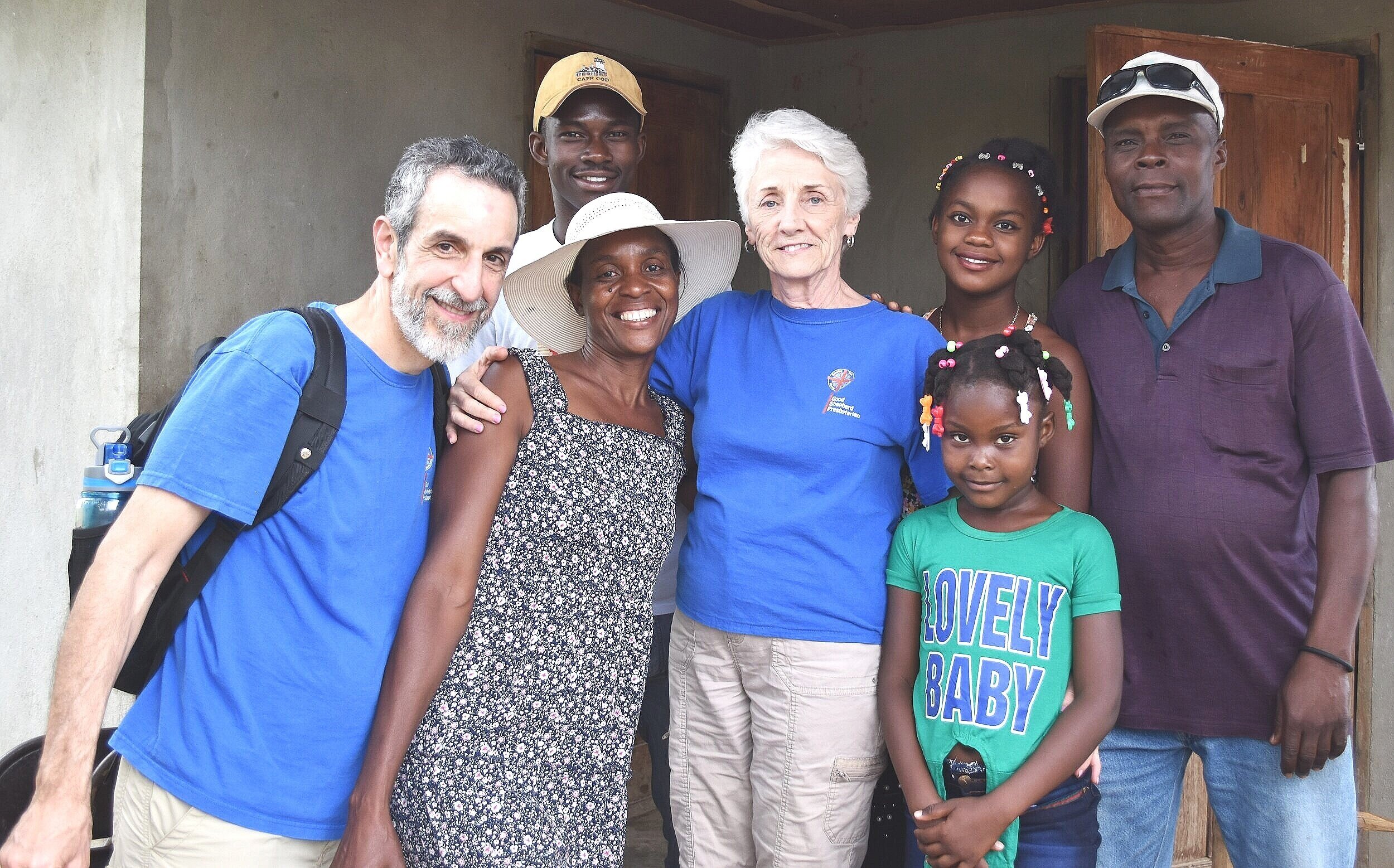
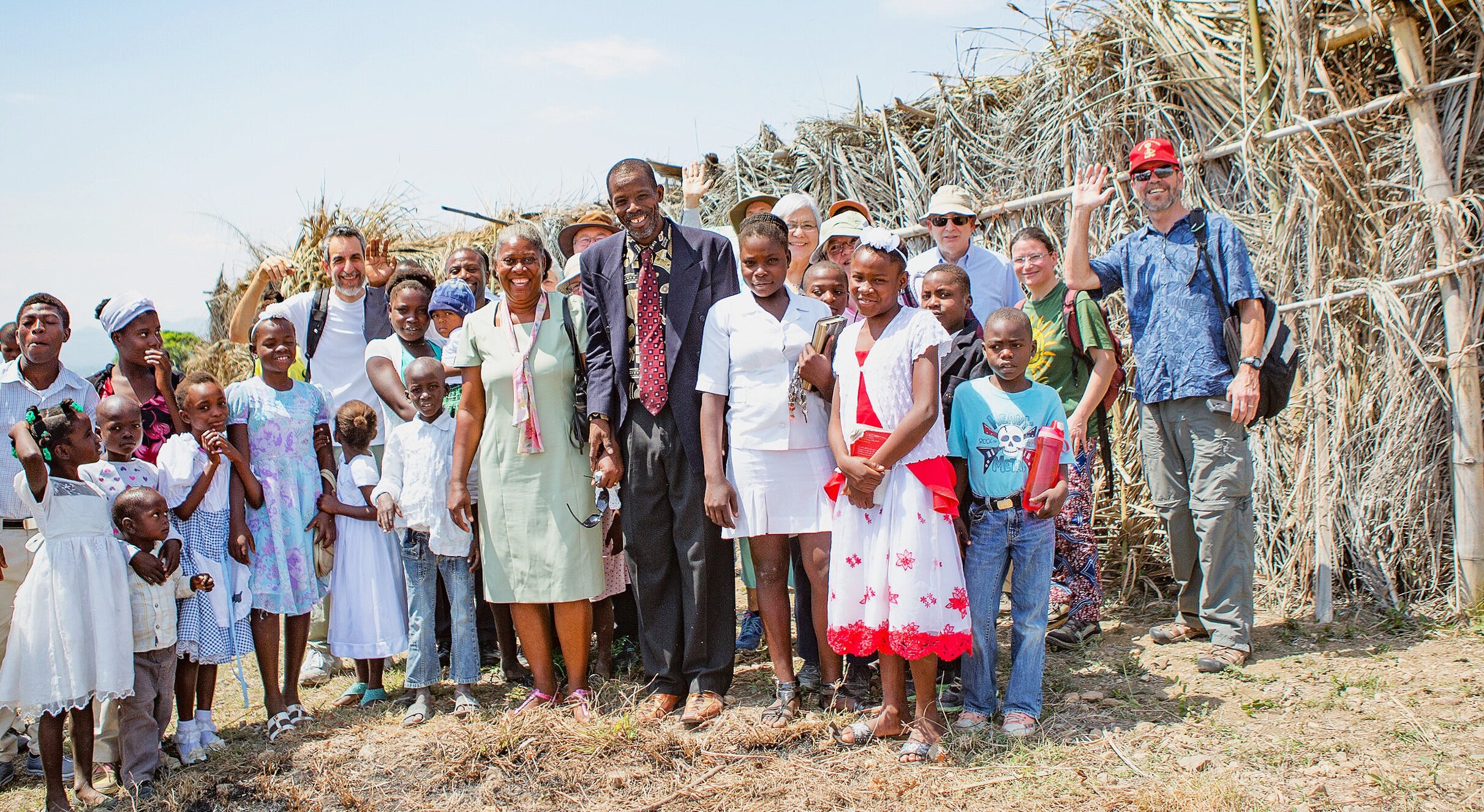
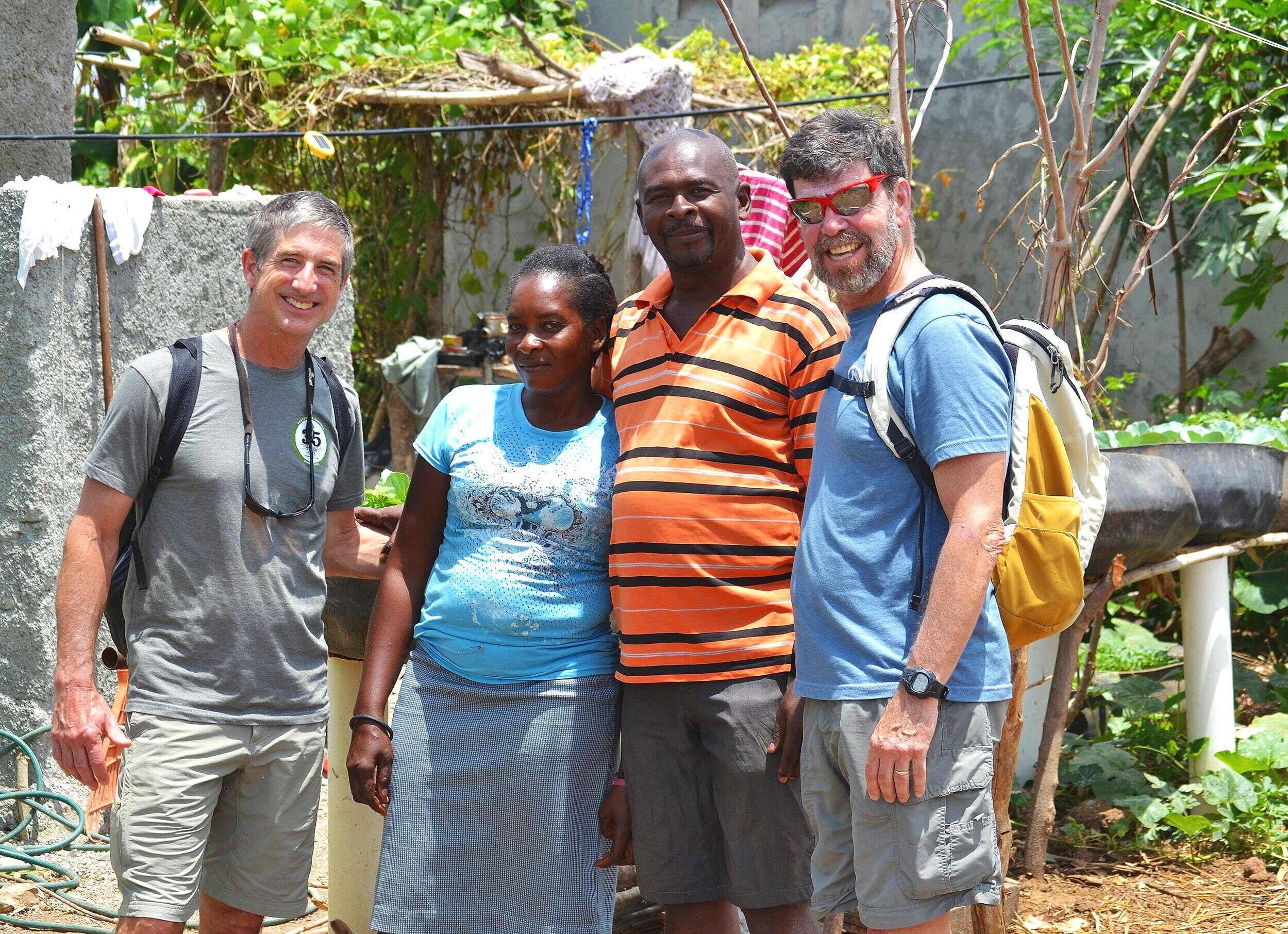
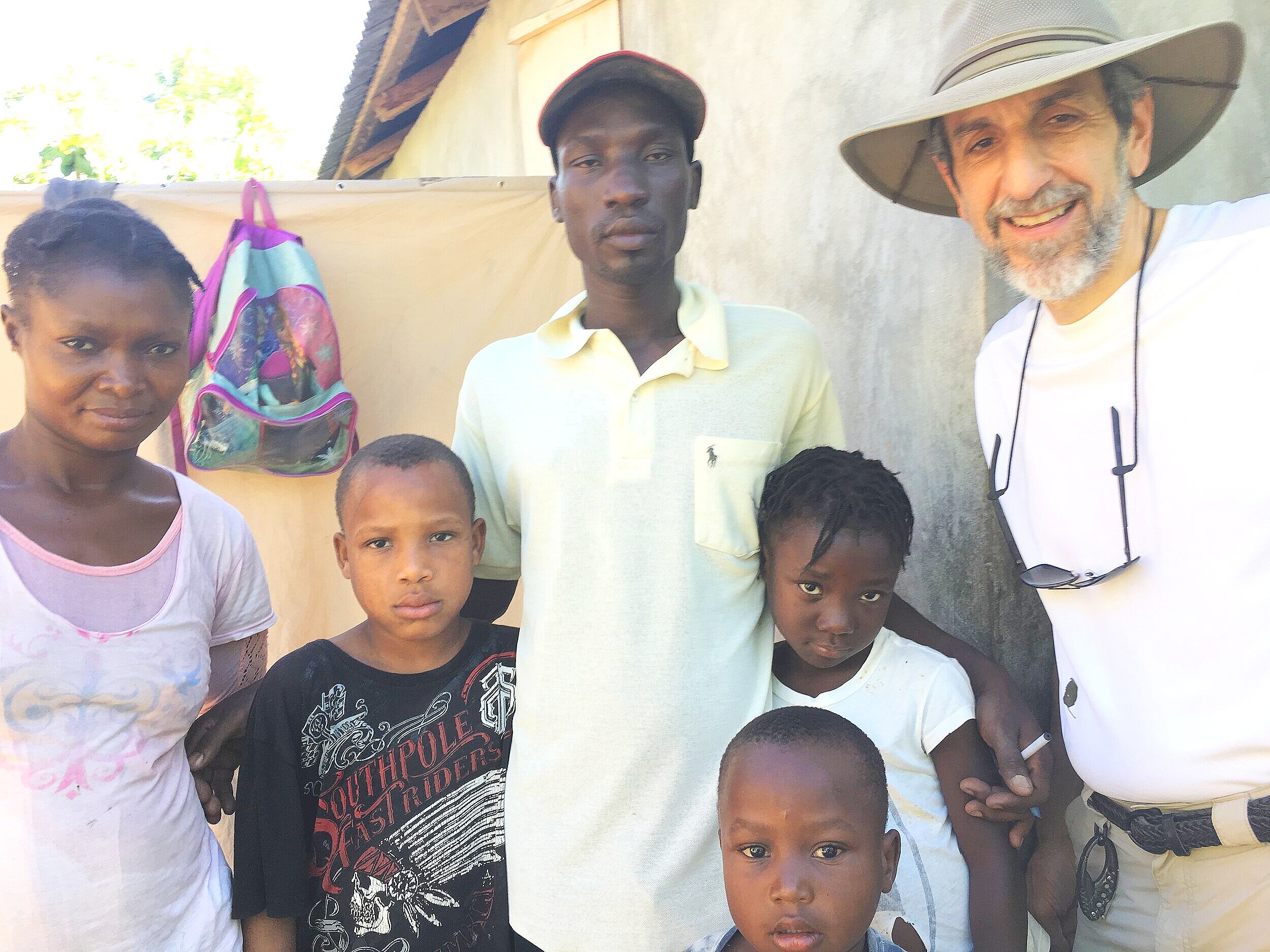
If you follow the news at all, you know that the President of Haiti, Jovenel Moise, was assassinated at his home on July 7th. You may also know that 4 days prior to the assassination, Haiti was struck by Hurricane Elsa. These events happened while the country was struggling with political crisis, economic hardships and the coronavirus pandemic. My friends who know that I follow events in Haiti very closely have said "Boy, they just can't catch a break. Can they?"
It is true that political upheaval, bad weather events and economic hardship have been the story of Haiti for many years. It does seem like things have gotten a lot worse. For me, this is personal because I have friends in Haiti. Here in Atlanta, I have friends that have family in Haiti. So, while the seemingly insurmountable problems in Haiti are real, my concern lies with how our friends are impacted by all that is happening.
It is too dangerous to travel to Haiti right now. In fact, our friends tell us that it's too dangerous to travel in Haiti in many areas. Gang violence is on the rise. Kidnappings and murders are happening with little consequence to the perpetrators.
We are still able to communicate to our friends in Haiti via email and text messages. We have made friends with some of the people we have met in the EcoVillages, and they can now provide first-hand testimony to the conditions in the villages. (Their photos are above.)
Heguel (pictured above with Pat Murphy & David Evans) lives in village 6. He says, "Every day I speak to the people from EcoVillages where I live. Everything is going well in the countryside, most of the problems are in Port au Prince."
Carlos (pictured with his family, Jeanine, and myself) is a doctor living in Hinche. His family lives in village 4. He describes the situation as "the country is still in a very volatile calm". He goes on to say "… everyone remains vigilant about not knowing what will happen."
Donald (pictured with his family and me in 2017) describes his attitude this way: "For things that concern politics in Haiti, this causes a lot of difficulty but despite everything I put everything in the hands of our savior Jesus Christ".
Germeil (pictured with his wife, his church and our mission group in 2017) is a pastor with whom we worshiped together on Easter Sunday. He says "We are doing well and the gardens are going well with the grace of God. We hold the brethren of Atlanta firmly in memory of our prayers and thoughts."
The silver lining is that the people still have homes in the EcoVillages. The rains have been plentiful so they should have a good year in their gardens. These past 2 years have presented many setbacks, but life goes on in the villages.
The school is out for summer and will be in session this Fall. With the strong, continued support of our donors and oversight by MPP, the children will learn and teachers will be paid.
If you want to hear first-hand testimony from a villager, you are in luck! One of the villagers will be coming to Atlanta and you can meet him on August 1st. Click here to see that invitation.
COVID and the Big Test at the Ecovillage School
COVID is peaking in Haiti and it is adding grief and loss to this country. And we just learned from a villager that our school in the EcoVIllage (along with all schools in Haiti) has been closed by the Ministry. We don’t know how long this will continue or how it will impact our class taking their exams.
This is an important year in the life of the School in the EcoVillages of Haiti. For the first time ever, since opening eight years ago, our EcoVillage School has a ninth grade class! Like many countries around the world, Haiti issues a test at the end of the school year to determine if a child is able to attend high school.
The test is called the "9th AF Exam" and will be issued in July 12-14, 2021. There will be 15 children from the EcoVillage school taking the test. Four of those children have attended our school each of the 8 years it has been open. We have profiled some of these children before and you can read their stories here:
Please give generously to the Haiti Mission and "Give a Child a Chance"
The Uncertain Future of Travel to Haiti
Our group meets with the Principal of the Ecovillage school in April, 2019
Our Mission has sent more than 50 different people to the Ecovillages of Haiti over the past 8 years. The experience changes your perspective but not in the ways you might think.
You might expect that the poverty would be depressing. You might think that it would make you more grateful for the relative affluence and comfort in your own life. While there may be some of that, it's the personal connection to the people you travel with and the people you meet along the way that makes the largest impact. The difficulty of getting from place to place, the stay in stark accommodations and the language barrier make each day challenging. These hardships create an unshakable bond with your travel mates. There is also a connection with the people of Haiti. An understanding that they are people like us who are just trying to get by from day to day. They work to support their families. They want better lives for their children. They worship the true God each Sunday. They are different from us only in their circumstances which, in large part, are not under their control.
I yearn for another trip to Haiti. I want to visit the people that I have met and have come to know. I want to see the children at the school and assess their progress. There's a desire to "check in" to see what has changed and what has not changed.
We had planned a trip in March of 2020 but the pandemic forced us to postpone our plans. Today, there is civil unrest, political upheaval and economic hardship worse than the country has experienced for more than a decade. The desperation of the times and civil disorder in Haiti has resulted in a dramatic increase in criminal activity. While we would like to see our friends in Haiti, our hosts cannot guarantee our physical safety while traveling in the country. It is likely that this situation will not change until a new government can be formed in 2022 and there is no assurance that things will be better then either.
It is hard writing these words. Putting words to this situation forces us to confront the reality. Many have little hope for improvement in Haiti. But we can still make a huge difference in the lives of people we know by staying engaged. The children get a chance to learn because we stay engaged. We need each other.
Please continue to pray for the people of Haiti and give generously to support our mission.
A Chance for a Better Future for Each Child
Our mission in Haiti is a bold act in several ways. We did not build a school. They did. We do not operate the school. They do. We provided the resources necessary to build the school and will continue to provide support until the school can sustain itself without our assistance.
It's a bold and unique plan. Over 80% of school children in Haiti attend private school mostly run by foreign-based agencies. Our school is a public school, designed, built and operated by Haitian people. It received certification from the Ministry of Education in 2018 after proving the quality of instruction and organization.
Without the school, this fledgling community in the rural, central plateau would not be able to provide education for their children. Without an education, these children would have no chance to escape the cycle of poverty that has plagued this small nation for decades. Our school gives these children a chance and hope for a better future.
Matthew 25:31–46 calls us to actively engage in the world around us. In response, the PCUSA encourages us to "act boldly and compassionately to serve people who are hungry, oppressed, imprisoned or poor".
Please continue to give these children a chance. Donate here.
Celebrating Textbooks
Kids at the EcoVillage School depend on their parents to buy textbooks for school. This is the Haitian way. But the parents of our kids are too poor to buy those texts. Can you imagine how hard it is to learn math and science only by lecture and recitation using chalk and blackboard? Responding to that need, the Finance Council at North Decatur Presbyterian Church authorized a mini-grant. As soon as they learned of the funding, Directeur Ramin ordered the textbooks for 7th, 8th and 9th grade math and science. They have arrived in time to be used this year. This is particularly important as the first class of 9th graders to graduate from the EcoVillage National Fundamental School will take their high school qualifying exams this summer. They will now have texts to help them bone up for the big national exam.
Arrival of the new textbooks was a day of celebration, worthy of a photo to mark the occasion.
Here’s what 7th, 8th, 9th grade textbooks look like in Haiti. Imagine how much more they will be able to learn.
Magdaline
When we sat down with Magdaline Desamour in April 2019, I was struck by the poise of the teenage girl who is a student at the EcoVillage School. The cheerful, well-groomed 16 year old was glad to talk to us about the school that she loves and has attended since the 3rd grade. She proudly wears the blue and white checked uniform of the National School System of Haiti. The cleanliness and pressed appearance of her uniform is remarkable when I consider her 45-minute walk to school along dirt roads from her home in the nearby village of Matbonite.
Magdaline was in the 6th grade in 2019 when we talked with her. The 4-year delay in her schooling is not unusual in Haiti because access to education is difficult for many children and external factors can sometimes delay opportunity to attend school. For Magdaline, she missed school during the time when the earthquake of 2010 closed many schools across the country.
She attends the EcoVillage School along with two brothers and one sister out of her eight siblings. I wonder how such a large family can thrive in these rural parts of Haiti. But the teenager’s smile belies the difficulties of daily life and exemplifies the resilience of the people we meet when we visit Haiti.
Magdaline told us that she studies Mathematics, French, Social Sciences, Experimental Science and Kreyol. In the 6th grade, there is one teacher that teaches all the subject areas. She shares that French is her favorite subject. This is the official language of schools in Haiti. As a former French colony until its independence in 1804, French has persisted as the Official language of government, education and the media.
Magdaline and her siblings are among the 70% of students attending the EcoVillage School that live outside the villages. This is consistent with the vision of Chavannes Jean-Baptiste, the founder of our partner organization MPP who wanted to make sure that a quality education was available to all the people in the area and not just those families transplanted here after the Earthquake of 2010.
We are reassured of the success of the school as Magdaline tells us {via translation} “I love my principal and I love my teacher because they give me a great education. He teaches us lots of new things. He gives us knowledge of many things. My previous school; it wasn’t that great. But when I started coming here; it is a great experience. “ She continues by telling us “I would love for this school to continue on the path of a great education.”
We hope that she will pass the National Exam and proceed on to high school. Opportunity beyond that is uncertain for sure but you get the sense that she knows any opportunity would not be possible without the primary education she is getting now. That education is only possible because of the school that we helped to build. A school conceived and operated by Haitians and supported by our many American donors.
contributed by C. CaliaMonseur Wuldriqueand the 6th grade class at the EcoVillage School in 2019.
Alternative Gift Market
The best Alternative Gift Market in town! We always enjoy and appreciate the wide selection of guests, shoppers and vendors at this event. We hope to see you virtually. Notecards are available for purchase and donations in honor of a teacher make a great gift! Click here to go directly to the Alternative Gift Market page on our website.
A Boy with a Future
D’Jephly sits down to talk with us in April, 2019
D’Jephly Viscount was 14 years old and in the 7th grade when we interviewed him in April, 2019. Today, he is part of the 9th grade class at the Ecovillage School that will take the National Exam that will determine if he can progress to high school.
His family lives in the nearby town of Colladere. Approximately two-thirds of the students at the Ecovillage School live outside the villages. It was one of the goals of this project to provide a quality education not only for the children living in the Ecovillages but to serve the surrounding community as well.
D’Jephly started his education at the primary school near his home in Colladere. He switched to attend the Echovillage School when he was in the 3rd grade because his parents thought he would get a better education there. He has 5 brothers and 2 of them attend the 4th grade at our school.
He and his brothers must walk for one hour each way to attend school. This is common in rural Haiti where transportation services are nearly non-existent. But his parents, like many parents in Haiti and around the world, recognize the critical importance of education as a key to a better life. Many of the parents in Haiti cannot read themselves and must rely on the schools to provide instruction, books and other resources essential to education.
This stage of school is equivalent to middle school in the United States. The students receive instruction in multiple subject areas including English, Spanish, Math, French, Social Sciences, Experimental Sciences, and Kreyol. The different subjects are taught by different teachers who specialize in the various subjects. The principal at the school is also the Kreyol instructor.
D’Jephly told us his favorite subject is English. Perhaps he was simply trying to please us, but we had a small exchange in English. It is hard for these students because there is no place to use English outside the classroom.
Like most boys in Haiti, he likes to play football (soccer) and wishes there was a playground at the school for boys and girls to play games when not in class. He also told us he wished there was transportation because it’s a very long walk for him.
We pray that D’Jephly is successful in passing the 9th AF Exam in July 2021 and that he can move on to High School. That would be his best chance at a better life and the aspirations his parents have for him.
Boys at the EcoVillage School play soccer on a makeshift field with balls donated by the Partnership.
Meet Beatrice
Beatrice is 16 years old and in the 8th grade class at the EcoVillage School (aka Ecole Nationale St Jean Bapiste de Beganabe). She has attended the school all six years that it has been open. I had the opportunity to interview her during our trip to Haiti in April 2019.
She grew up in the town of Jacmel in the southern part of Haiti. She has 3 brothers. In 2010, the earthquake that devastated Haiti destroyed her home. Both of her parents died. She moved in with her aunt and continued to live in Jacmel for a while but life was difficult there in the aftermath of the earthquake.
When given the opportunity to move to the Central Plateau, she moved with her aunt’s family to the EcoVillages. There she was able to have a home, healthy food to eat and to go to school. She lost a couple of years of schooling because of the earthquake but the school in the EcoVillages has given her the opportunity to continue her education.
Beatrice told me about how much she loves her school, her teachers and her principal. She is able to have an opportunity for a better future through education because of the dedication of MPP to make the school a reality and the donations of the Americans who support their efforts.
submitted by C. Calia
Beatrice in the 5th grade. Photo taken during our trip in April, 2017.
Beatrice in 2017 with Artwork describing herself
First Class of Ninth Graders at Haiti EcoVillage School!
This is a critical year for the 9th graders at the Haiti EcoVillage School. They must complete the required curriculum and pass the Haitian National Performance Examination. Passing the exam opens the possibilities of further education and a vision for the future. They are working hard now to meet this challenge and to surpass expectations!
As they work in their studies, the Haiti EcoVillage School Partnership is working to find funding to keep the school open. Our teachers and our students are depending on our success so they have choices for their futures.
You can help. Click here to donate so we all surpass our goals!
Hunger Relief at Just the Right Time
In the past year, Haiti has been stricken with political upheaval, economic hardship, drought and now COVID-19. We put out an appeal to help the people of the EcoVillages and you responded. Within days of our asking, we were able to send money to buy food and seeds for the villagers.
They sent us this video in response to our generous gift.
Staying Connected
Back in October, I wrote about my friend Carlos (see “My Friend Carlos”). He continues to write emails to me when he can get access to a computer. In this time when it is not possible for us to travel to Haiti, Carlos has become an important, reliable source of news about the people of the Ecovillages and the school. In a recent email, he wrote about the present situation:
“At the moment things are very complicated in the villages. The land is completely dry, deserted, with no planting because the rainy season has not yet started. During this period the villagers have no activity.
The rainy season gives them activity. They will work together in their gardens when all the villages are green and very beautiful. When the rainy season arrives (this year), I don't think they will have the means to cultivate their land since they barely manage to find food once a day.
The current situation is extremely difficult for them. I could see it in 2 villages that I visited but my father told me that it is like that in all the villages. They share food with each other when possible. I saw my family feeding the children of another neighbor and it pleases my father very much to be able to help people even if he also needs help.
We are in the mango season. Some children eat them prematurely for lunch and sometimes for the whole day. They buy food on credit more often than not and cannot pay.
Once the mayor or the delegate of the city of Hinche sent a small bit of rice for them and my father took advantage to benefit the people who live near the villages because they are also in the same starvation situation.
The school hasn't been running for more than a month or so (as all schools in Haiti are shutdown during the pandemic). I think the kids will not lose the whole school year.”
An image from 2019 after the rains have arrived.
In the United States, losing your job may mean you have to drive to a food bank to be able to feed your family. But, in Haiti, there is no safety net; just going without. They share what little they have with each other. When they contact us, they ask “how are you doing?”
submitted by C. Calia
Remembering Haiti
This time last year, we were celebrating Easter in a church in Hinche, Haiti. It was a blessing to travel to Haiti with a group of 9 Americans focused on working with Haitian partners to sustain a school in the Central Plateau. Personal bonds were forged with our Haitian friends and our traveling companions. The experience was deeply impactful and leaves us in a state where Haiti is never far from our thoughts.
Our travel delegation to Haiti in 2019
Plans to return to Haiti in 2020 have been scrapped amid the pandemic. Our friends and supporters ask us how Haiti is fairing in the midst of the pandemic. The simple answer is that the health impact is small for now. To date, Haiti has reported 58 cases of COVID-19 and 4 deaths. But the Dominican Republic has been hit hard and a new story published in the New York Times outlines the threat of laid off Haitians in the DR bringing the virus across the border.
Experts say that no country will be spared in this pandemic. Neither warm weather nor limited travel by foreigners will prevent some level of sickness and death. In a country with poor public health infrastructure and data collection, we'll probably never know how many people in Haiti contract the virus and how many die from it.
COVID-19 poses new challenges. How do you practice social distancing in a country that has no infrastructure to support a "stay at home" policy? How do you care for contagious people in a country with too few hospital beds, limited medical equipment and little capacity to produce medicines? This is different than past disasters (like the earthquake of 2010) because foreign assistance is unlikely when so-called "first world" countries are struggling to fight the pandemic and most NGOs have pulled out of the country. Haiti is left to go it alone.
This past year has been tough on the people of Haiti. A country that is no stranger to hardship, the past year has seen economic volatility, food insecurity and political unrest. There is little trust in the government. More than half of Haitians live "hand to mouth". It is unlikely that the cycle of subsistence living and dependence on foreign aid will end any time soon.
We follow the news in Haiti, we communicate with our friends who live there and we continue to work with our partners to seek ways to help. They are a resilient people who are no stranger to disasters both natural and man-made.
Some of the over 300 children getting an education at the school we helped to build.
In midst of all this, a truth emerges that families survive, children grow, and families continue to hope for a brighter future for their children. That is why education continues to be a priority. Education is still the single biggest factor in lifting people out of material poverty.
Some of the parents we met with during our visit in 2019.
Our mission to help the people of the Central Plateau has seen many successes. Construction of 9 classrooms and a refectory are complete. For 5 years, children who might have otherwise been denied education have been taught by dedicated, professional teachers. The school has been recognized for its quality and has been nationalized. Our support and their determination has brought these successes. But current hardships put the future in doubt.
Our unwavering plan is for a self-sustaining school that is run by Haitians and supported by Haitians. Turmoil in the government has slowed progress toward public funding for the school. Our agricultural initiatives have been thwarted by drought, economic recession and other complications. Without a trip to visit with our partners, our planning has stalled. For now, we continue to support the school financially and pray that we will be able to resume our work soon.
As we sang together in Creole last Easter, “Nap marche -Na Lee-mu-yeah Bon Dye-a.” which roughly translates to "We are marching in the light of God.".
Let’s keep marching with our partners, virtually for the present, through the COVID-19 Pandemic and through prolonged crisis in governance in Haiti.
Thank you for your creative thoughts and solidarity.
Contributed by Chris Calia & Bailey Green
P.S. Sunday, April 26, 2020 is the date we originally planned to hold our annual fundraiser at the Clarkston Community Center. This event is on hold indefinitely but the need continues. Please consider a donation through our website or your local church to keep these children in school.
A Prayer for Justice
In Genesis 1:31 God saw all that he had made, and declared it was very good. The remainder of the Bible describes how man messed it up. Which brings me to the subject of Haiti.
Haiti is a mess. We knew it was a mess when we started our mission work there but, right now, it is particularly bad. As we followed the news over the last year, we know that there have been several periods of protests against the current government. The protesters claim that the government is corrupt and has misappropriated billions of dollars intended to rebuild the country's infrastructure and economy. As a result, there is price inflation, fuel shortages and starvation. The food situation is exacerbated by an extended dry period that has thwarted food production.
The political unrest in Haiti is part of phenomenon known as the Global Protest Wave of 2019 which played out in many countries around the world including Bolivia, Chile, Columbia, Libya, Lebanon, Iraq, Iran, and Hong Kong. In each case, the people are mistreated by their own government and find their only remedy is to pour out into the streets in protest.
So, today, we pray for resolution to the political situation in Haiti along with all those troubled places where injustice is playing out.
The situation for the people of the Ecovillages has grown worse as the country has fallen into disarray. We pray that the Spring rains will be plentiful this year and they have a good crop. In the meantime, food, money and jobs are in short supply.
We learned that the school we helped to build was shut down for a few weeks in the Fall along with most institutions in the country during the peak of the protests. School is back in session now and they are making up for lost days. The school building is now complete and the enrollment is around 300 students in grades K-8. The funds we contribute pay for the teachers and other staff. We continue to work with our partner, MPP, to develop a mechanism for self-funding even as it is evident that support from the government is unlikely in the near future. Next year, we expect some of the students to progress to the 9th grade and take the national exam which is the gateway to high school.
In the mist of all the dismal news, the truth remains that hope for the next generation lies in education. Even with all the struggle, the school is a top priority for the parents.
So, we pray for the villagers, the school staff, the parents and the students to thrive in the shadow of adversity and to succeed where success seems so rare.
A lot has transpired since our last trip to Haiti in April of last year. We read the news and get occasional emails about the situation. But our experience with the Ecovillage school mission is that we don't truly know what's happening on the ground without traveling there. So, in March of this year, we plan to send a delegation to Haiti to meet with our friends, find out what's going on and assist them with a path forward. We pray for safe travel and success in our quest for answers. The people of Haiti put their hope in our Savior Jesus Christ. They are our Christian brothers and sisters. We pray and worship together in solidarity. This mission reminds us to praise God for our many blessings and for the opportunity to help others in need.
May God continue to bless the United States and continue to use those blessings to help others.
Amen
(a prayer of intercession at Good Shepherd Presbyterian Church 1/26/2020)
“We are living a disaster.”
Perhaps you remember Chavannes, founder of the EcoVillages in rural Haiti, as the grandfatherly gentleman who visited Atlanta last year. He thanked us for building the EcoVillage School and asked us to help finish the project.
Today, he is more Jeremiah than grandpa, prophetically calling on the President and his wealthy supporters to mend their ways. He is helping lead the nationwide, peaceful rebellion against corruption in government and oppression of Haiti’s poor.
Haiti is in crisis. What began months ago as occasional demonstrations has escalated into a full-fledged effort to shut down the country until the government falls. Schools, government functions, ports and banks are closed. President Moise refuses to resign, with the support of the U.S. government. (To learn more about the backstory of the people’s revolt read “ ’There Is No Hope’: Crisis Pushes Haiti to Brink of Collapse,” New York Times, October 21 https://www.nytimes.com/2019/10/20/world/americas/Haiti-crisis-violence.html )
The unrest, which in the first months was concentrated in the capitol Port-au-Prince, has now reached our friends in the Central Plateau.
Pressure and threats to join the nationwide shutdown led to the closing of the EcoVillage School in October. A few days ago, Director Ramain and the parents courageously reopened the school, watching to see if it will be safe. Almost all of the other schools in the country are closed.
Our friends in the EcoVillages are fortunate to have their own food. They can subsist, but many others are in trouble. 60% of Haiti’s food comes from imports. NGOs report that as many as 3.5 million people need emergency food assistance now. (To learn more about the current food crisis read, NGOs warn about deterioration of food security in Haiti,” ReliefWeb, November 21 https://reliefweb.int/report/haiti/ngos-warn-about-deterioration-food-security-haiti-more-35-million-people-need-emergency )
The Atlanta EcoVillage School Partnership will keep you informed about events. Haiti was in the news on January 12, the 10th anniversary of the greatest natural disaster in the history of the Western Hemisphere, in which as many as 250,000 people died. Please keep the Haitian people in your prayers.


